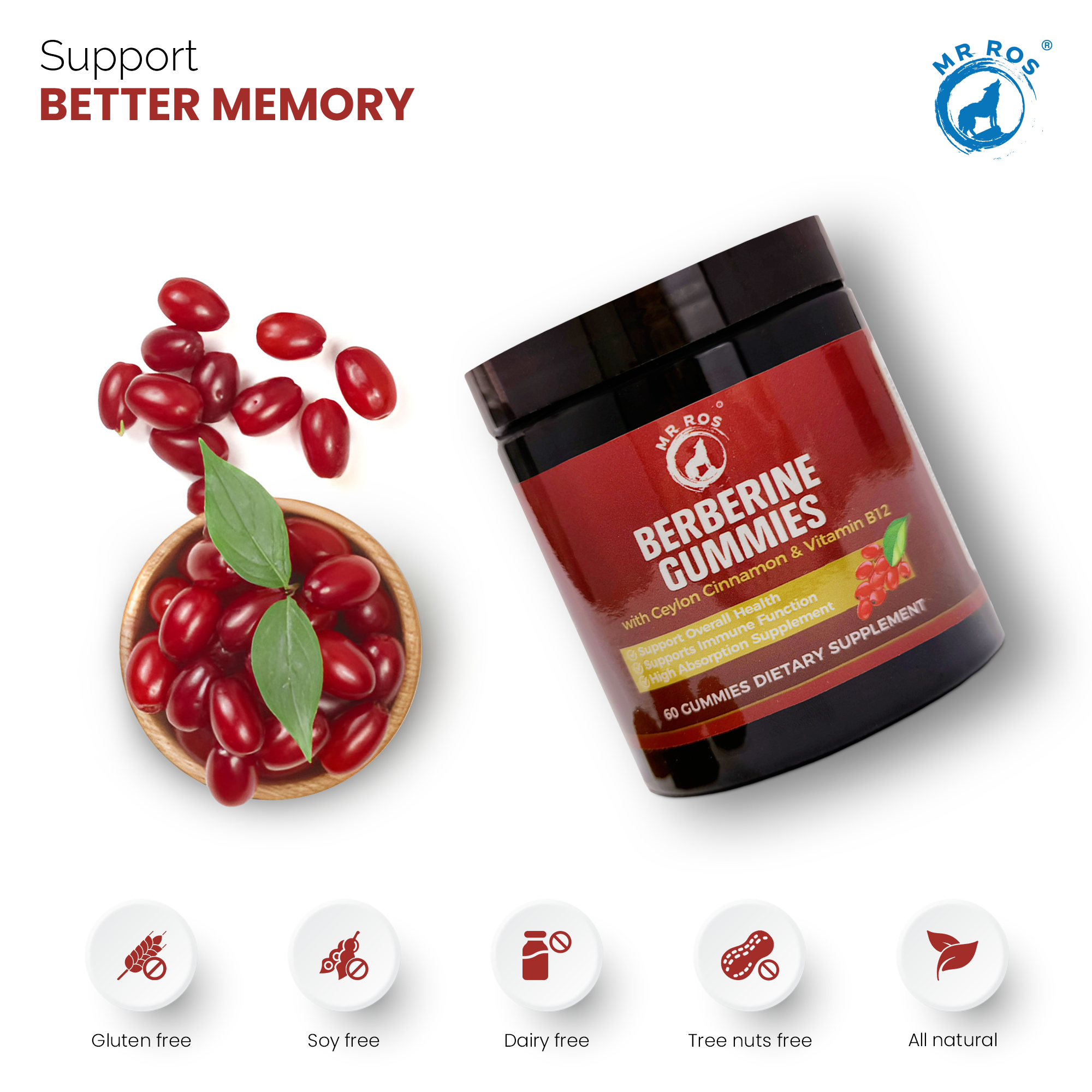Ozempic vs Berberine: Natural Alternatives for Weight Management and Metabolic Health
In the ever-evolving landscape of weight management and metabolic health, two contenders have emerged as powerful tools: Ozempic, a pharmaceutical heavyweight, and berberine, a natural compound with ancient roots. As the battle against obesity and type 2 diabetes intensifies, many are seeking effective solutions that balance efficacy with safety and accessibility. Let's dive into a comprehensive comparison of these two options to help you make an informed decision about your health journey.
## The Powerhouse Prescription: Ozempic
Ozempic, known scientifically as semaglutide, has revolutionized the treatment of obesity and type 2 diabetes. This synthetic medication mimics the GLP-1 hormone, which plays a crucial role in regulating blood sugar and appetite[1].
**How Ozempic Works:**
- Slows gastric emptying
- Increases insulin secretion
- Decreases glucagon production
- Reduces appetite
The results speak for themselves, with many users experiencing a dramatic 10-15% reduction in body weight over 6-12 months[1]. Additionally, Ozempic has shown impressive ability to lower HbA1c levels by 1.0-1.8%, outperforming many traditional diabetes medications[1].
## The Natural Contender: Berberine
While Ozempic commands attention in the pharmaceutical world, berberine has been quietly gaining recognition as a potential natural alternative. This yellow compound, found in plants like barberry and goldenseal, has been used for centuries in traditional Chinese and Ayurvedic medicine[1].
**Berberine's Mechanisms:**
- Activates AMPK (AMP-activated protein kinase)
- Improves insulin sensitivity
- Enhances glucose uptake in cells
- Inhibits glucose production in the liver
- May positively alter gut microbiome
Recent studies suggest that berberine can offer modest weight loss benefits, with users losing an average of 5 pounds over 12 weeks[1]. While not as potent as Ozempic, berberine has shown promise in blood sugar control, with HbA1c reductions of 0.5-1.5%, comparable to the widely-used diabetes drug metformin[1].
## Effectiveness: A Head-to-Head Comparison
When it comes to weight loss and blood sugar control, Ozempic clearly takes the lead in terms of raw effectiveness. However, this potency comes at a cost – both financially and in terms of potential side effects.
**Weight Loss:**
- Ozempic: 10-15% of body weight over 6-12 months
- Berberine: About 5 pounds over 12 weeks
**Blood Sugar Control (HbA1c Reduction):**
- Ozempic: 1.0-1.8%
- Berberine: 0.5-1.5%
## Safety and Side Effects: Finding the Right Balance
As with any medical intervention, both Ozempic and berberine come with potential side effects that must be considered.
**Ozempic Side Effects:**
- Nausea (15-20% of users)
- Vomiting (5-9% of users)
- Diarrhea
- Abdominal pain
- Constipation
**Berberine Side Effects:**
- Gastrointestinal discomfort
- Constipation
- Diarrhea (less frequent than Ozempic)
While Ozempic's side effects can be more pronounced, berberine is generally considered safe for long-term use. However, it's important to note that there is less long-term data available for berberine compared to the rigorously tested Ozempic.
## Accessibility and Cost: Breaking Down the Barriers
One of the most significant differences between Ozempic and berberine lies in their accessibility and cost.
**Ozempic:**
- Prescription-only
- Costs $800-$1300 per month
- Administered via weekly subcutaneous injection
**Berberine:**
- Available over-the-counter as a dietary supplement
- Costs $20-$40 per month
- Taken orally 2-3 times daily
For those seeking a more affordable and easily accessible option, berberine presents an attractive alternative. However, it's crucial to remember that as a dietary supplement, berberine is not regulated by the FDA in the same way as prescription medications.
## The Natural Choice: Exploring Berberine Options
For those intrigued by the potential of berberine as a natural alternative to Ozempic, there are high-quality options available. One such product is the Berberine HCL 1200mg supplement, which offers a potent dose of berberine in an easy-to-take capsule form.
You can find this product on Amazon: Berberine Gummies 60 Count $19.99
## Making an Informed Decision
While Ozempic offers powerful results backed by extensive clinical trials, berberine presents a natural alternative with promising potential and fewer barriers to access. The choice between these two options ultimately depends on individual health needs, financial considerations, and personal preferences.
It's crucial to consult with a healthcare professional before starting any new supplement or medication regimen, especially if you have pre-existing health conditions or are taking other medications.
By understanding the strengths and limitations of both Ozempic and berberine, you can make an informed decision that aligns with your health goals and lifestyle. Whether you choose the pharmaceutical powerhouse or the natural contender, remember that sustainable weight management and metabolic health involve a holistic approach that includes a balanced diet, regular exercise, and overall healthy lifestyle choices.
You can find this product on Amazon: Berberine Gummies 60 Count $19.99
In the ever-evolving landscape of weight management and metabolic health, two contenders have emerged as powerful tools: Ozempic, a pharmaceutical heavyweight, and berberine, a natural compound with ancient roots. As the battle against obesity and type 2 diabetes intensifies, many are seeking effective solutions that balance efficacy with safety and accessibility. Let's dive into a comprehensive comparison of these two options to help you make an informed decision about your health journey.
## The Powerhouse Prescription: Ozempic
Ozempic, known scientifically as semaglutide, has revolutionized the treatment of obesity and type 2 diabetes. This synthetic medication mimics the GLP-1 hormone, which plays a crucial role in regulating blood sugar and appetite[1].
**How Ozempic Works:**
- Slows gastric emptying
- Increases insulin secretion
- Decreases glucagon production
- Reduces appetite
The results speak for themselves, with many users experiencing a dramatic 10-15% reduction in body weight over 6-12 months[1]. Additionally, Ozempic has shown impressive ability to lower HbA1c levels by 1.0-1.8%, outperforming many traditional diabetes medications[1].
## The Natural Contender: Berberine
While Ozempic commands attention in the pharmaceutical world, berberine has been quietly gaining recognition as a potential natural alternative. This yellow compound, found in plants like barberry and goldenseal, has been used for centuries in traditional Chinese and Ayurvedic medicine[1].
**Berberine's Mechanisms:**
- Activates AMPK (AMP-activated protein kinase)
- Improves insulin sensitivity
- Enhances glucose uptake in cells
- Inhibits glucose production in the liver
- May positively alter gut microbiome
Recent studies suggest that berberine can offer modest weight loss benefits, with users losing an average of 5 pounds over 12 weeks[1]. While not as potent as Ozempic, berberine has shown promise in blood sugar control, with HbA1c reductions of 0.5-1.5%, comparable to the widely-used diabetes drug metformin[1].
## Effectiveness: A Head-to-Head Comparison
When it comes to weight loss and blood sugar control, Ozempic clearly takes the lead in terms of raw effectiveness. However, this potency comes at a cost – both financially and in terms of potential side effects.
**Weight Loss:**
- Ozempic: 10-15% of body weight over 6-12 months
- Berberine: About 5 pounds over 12 weeks
**Blood Sugar Control (HbA1c Reduction):**
- Ozempic: 1.0-1.8%
- Berberine: 0.5-1.5%
## Safety and Side Effects: Finding the Right Balance
As with any medical intervention, both Ozempic and berberine come with potential side effects that must be considered.
**Ozempic Side Effects:**
- Nausea (15-20% of users)
- Vomiting (5-9% of users)
- Diarrhea
- Abdominal pain
- Constipation
**Berberine Side Effects:**
- Gastrointestinal discomfort
- Constipation
- Diarrhea (less frequent than Ozempic)
While Ozempic's side effects can be more pronounced, berberine is generally considered safe for long-term use. However, it's important to note that there is less long-term data available for berberine compared to the rigorously tested Ozempic.
## Accessibility and Cost: Breaking Down the Barriers
One of the most significant differences between Ozempic and berberine lies in their accessibility and cost.
**Ozempic:**
- Prescription-only
- Costs $800-$1300 per month
- Administered via weekly subcutaneous injection
**Berberine:**
- Available over-the-counter as a dietary supplement
- Costs $20-$40 per month
- Taken orally 2-3 times daily
For those seeking a more affordable and easily accessible option, berberine presents an attractive alternative. However, it's crucial to remember that as a dietary supplement, berberine is not regulated by the FDA in the same way as prescription medications.
## The Natural Choice: Exploring Berberine Options
For those intrigued by the potential of berberine as a natural alternative to Ozempic, there are high-quality options available. One such product is the Berberine HCL 1200mg supplement, which offers a potent dose of berberine in an easy-to-take capsule form.
You can find this product on Amazon: Berberine Gummies 60 Count $19.99
## Making an Informed Decision
While Ozempic offers powerful results backed by extensive clinical trials, berberine presents a natural alternative with promising potential and fewer barriers to access. The choice between these two options ultimately depends on individual health needs, financial considerations, and personal preferences.
It's crucial to consult with a healthcare professional before starting any new supplement or medication regimen, especially if you have pre-existing health conditions or are taking other medications.
By understanding the strengths and limitations of both Ozempic and berberine, you can make an informed decision that aligns with your health goals and lifestyle. Whether you choose the pharmaceutical powerhouse or the natural contender, remember that sustainable weight management and metabolic health involve a holistic approach that includes a balanced diet, regular exercise, and overall healthy lifestyle choices.
You can find this product on Amazon: Berberine Gummies 60 Count $19.99




Leave a comment
This site is protected by hCaptcha and the hCaptcha Privacy Policy and Terms of Service apply.